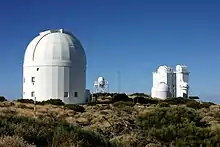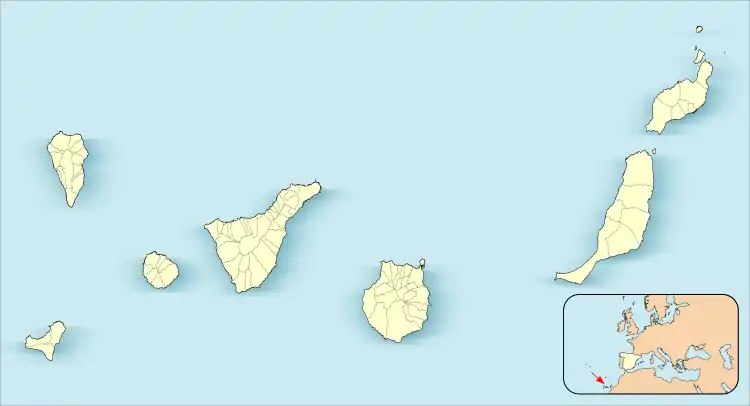ESA Optical Ground Station
The ESA Optical Ground Station (OGS Telescope or ESA Space Debris Telescope) is the European Space Agency's ground based observatory at the Teide Observatory on Tenerife, Spain, built for the observation of space debris. OGS is part of the Artemis experiment and is operated by the IAC (Instituto de Astrofísica de Canarias) and Ataman Science S.L.U.
 The ESA Optical Ground Station (on the left) | |
| Alternative names | OGS Telescope |
|---|---|
| Part of | Teide Observatory |
| Location(s) | Tenerife, Atlantic Ocean |
| Coordinates | 28°18′04″N 16°30′43″W |
| Organization | European Space Agency |
| Observatory code | J04 |
| Telescope style | optical telescope Ritchey–Chrétien telescope |
| Diameter | 1 m (3 ft 3 in) |
| Focal length | 13.3 m (43 ft 8 in) |
| Website | www |
 Location of ESA Optical Ground Station | |
The telescope is a 1-metre Coudé telescope with field of view of 0.7 degrees, supported by an English-built mount inside a dome 12.5-metre in diameter. Its main purposes are:
- to be the optical ground station of the Artemis telecommunications satellite (the project from which the telescope takes its name)
- to make surveys of space debris in different orbits around the Earth,
- to make surveys and follow-up observations of near-Earth objects as part of ESA's Space Situational Awareness programme, and
- to make scientific astronomical night observations.
It is equipped with a cryogenically cooled mosaic CCD-Camera of 4k×4k pixels. The detection threshold is between 19th and 21st magnitude, which corresponds to a capability to detect space debris objects as small as 10 cm in the geostationary ring. As a large part of the observation time is dedicated to space debris surveys, in particular the observation of space debris in the geostationary ring and in geostationary transfer orbits, the term ESA Space Debris Telescope became used very frequently. Space debris surveys are carried out every month, centered on New Moon.
Since 2006, the telescope has also been used as a receiver station for quantum communication experiments (such as testing Bell inequalities, quantum cryptography, quantum teleportation), with the sender station being 143 km away in the observatory on La Palma.[1] This is possible because this telescope can be tilted to a near-horizontal position to point it at La Palma, which many large astronomical telescopes are unable to do.
List of discovered minor planets
EAS OGS has been credited by the Minor Planet Center with the discovery of 37 minor planets.[2] These are:
| (231609) 2009 RV | 10 September 2009 | list |
| (241554) 2010 FA93 | 23 March 2010 | list |
| (246849) 2010 FB48 | 22 March 2010 | list |
| (251626) 2010 FM53 | 22 March 2010 | list |
| (257422) 2010 FR47 | 22 March 2010 | list |
| (257423) 2010 FM48 | 22 March 2010 | list |
| 284891 Kona | 13 September 2009 | list |
| (296587) 2009 RA26 | 13 September 2009 | list |
| 297005 Ellirichter | 22 March 2010 | list |
| (301679) 2010 FA48 | 22 March 2010 | list |
| (312714) 2010 RR3 | 1 September 2010 | list |
| (321480) 2009 RZ69 | 10 September 2009 | list |
| (321810) 2010 RK4 | 1 September 2010 | list |
| (325476) 2009 RY | 10 September 2009 | list |
| (325791) 2010 RX4 | 1 September 2010 | list |
| (330873) 2009 RQ1 | 10 September 2009 | list |
| 332706 Karlheidlas | 13 September 2009 | list |
| (343557) 2010 FX47 | 22 March 2010 | list |
| (343577) 2010 FF88 | 22 March 2010 | list |
| (347299) 2011 OA28 | 1 June 2011 | list |
| (356298) 2010 FT47 | 22 March 2010 | list |
| (362429) 2010 RU4 | 1 September 2010 | list |
| (365291) 2009 RO26 | 13 September 2009 | list |
| (368098) 2013 BP70 | 6 June 2010 | list |
| (369284) 2009 RQ26 | 13 September 2009 | list |
| (381725) 2009 RP5 | 13 September 2009 | list |
| (386618) 2009 RD26 | 13 September 2009 | list |
| (398163) 2010 FS47 | 22 March 2010 | list |
| (403532) 2010 FG88 | 22 March 2010 | list |
| (419562) 2010 RF5 | 1 September 2010 | list |
| 420779 Świdwin | 11 April 2013 | list |
| (436317) 2010 FP47 | 22 March 2010 | list |
| (438881) 2009 RD28 | 10 September 2009 | list |
| (457818) 2009 RB58 | 10 September 2009 | list |
| (463362) 2012 TB30 | 15 September 2012 | list |
| (481993) 2009 RO27 | 13 September 2009 | list |
| (482129) 2010 RC5 | 1 September 2010 | list |
See also
References
- "ESA observatory breaks world quantum teleportation record". ESA press release. 6 September 2012.
- "Minor Planet Discoverers (by number)". Minor Planet Center. 12 January 2017. Retrieved 2 February 2017.